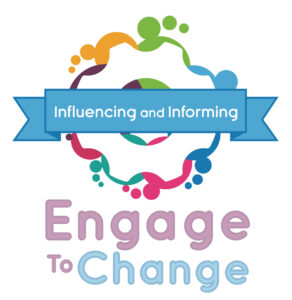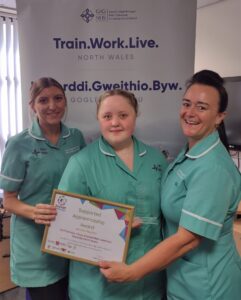
From 2016 to 2023, the Engage to Change project worked across Wales to support young people aged 16-25 with a learning difficulty, learning disability and/or autism to gain meaningful employment. This was then followed by Influencing and Informing Engage to Change, a partnership between Learning Disability Wales and National Centre for Mental Health (NCMH) at Cardiff University, to take forward the policy, research, and legacy work of the original project and advocate for a Wales National Job Coaching Strategy. The project finally came to an end on 31 March 2025.
Background
Due to the disability employment gap that exists in Wales, projects like Engage to Change are important in bringing about change. It is estimated there is a 31% gap between non-disabled and disabled people and that only 4.8% of people with a learning disability are in paid work.
People with a learning disability and autistic people can face many challenges when trying to find and keep paid work. For example, problems with understanding language or retaining information can make it difficult to learn new tasks or transfer skills learnt in a training setting to a real work environment. Some may struggle with social interaction or any changes to their working environment while others may have issues with time management and concentration. While these issues can make it difficult for people to find and keep a job, they do not mean that people cannot work. Engage to Change has clearly demonstrated that, with the right support, young people with a learning disability and/or autism can successfully find and maintain paid employment.
Engage to Change, funded by the National Lottery Community Fund in partnership with Welsh Government, focused on empowering young people to achieve their full potential at work, increasing employment rates while also improving their quality of life. Learning Disability Wales led the project while supported employment agencies ELITE and Agoriad Cyf delivered job coaching, paid work placements and paid jobs in ordinary workplaces. All Wales People First provided feedback from self-advocates while the research element of the project was carried out by the National Centre for Mental Health (NCMH) at Cardiff University. The project also partnered with DFN Project SEARCH to bring the first supported internship programmes to Wales.
Aims of the project
The Engage to Change team worked with young people, their parents/carers and employers to make sure the project met the needs of those involved. The team’s vision was to see a world in which people with a learning disability and/or autism had better well-being outcomes like independence, an income, personal and professional relationships, and fulfilment from paid work opportunities.
To achieve this, the project aimed to:
- overcome barriers to employment
- help young people develop transferable skills
- offer unpaid work experience
- provide paid supported employment
- find volunteering opportunities
- offer access to supported internships.
Findings of the project
Engage to Change has shown that many of the challenges that people with a learning disability or autistic people face can be overcome through supported employment using a job coach. This model can help people to find a job by:
- Spending time understanding people’s job interests, what they are good at as well as the type of job and working environment they need.
- Using job placements and try-outs to help people decide what they want to do and what support they might need.
- Finding and negotiating a job that meets the person’s talents and needs.
- Informing and supporting employers to make recruitment, induction and supervision accessible.
- Planning well with people and their families, and helping with welfare benefits to ensure they will be better off in work.
People may also need help to learn and keep a job by:

- Having a job coach with them at work to help them learn the job and to fit in.
- Breaking down tasks into small steps and providing a systematic approach to teaching the tasks of a job.
- Using prompts skilfully and reducing these over time until the person is able to carry out the job independently.
- Helping people to get work-based accreditation where they can.
- Helping people to fit in socially at work and helping their co-workers/supervisors to get on well with them.
Results of the project
Here are just some of the project’s amazing achievements since it started back in 2016:
- 1,300 young people with a learning difficulty, learning disability and/or autism were given employment support.
- 41% of young people secured a paid job, compared to the UK average of just 4.8%.
- Around 800 employers supported the project.
- Introduced supported internships to Wales for the first time and ensured that these are now available in all further education colleges.
- Provided accredited training for employees and employers.
Influencing and Informing
Although the Engage to Change project stopped taking referrals in 2023, the team continued to take forward the policy, research, and legacy work as well as advocating for a National Job Coaching Strategy for Wales.
Influencing and Informing Engage to Change continued to work with Welsh Government to ensure job coach support was available through Jobs Growth Wales+ and supported shared apprenticeships. They also worked with Members of the Senedd, local authorities, colleges and other organisations to make sure that supported employment (including specialist job coach support) will be funded and available across Wales in the future.
The team shared information from the research and evaluation of the project as well as personal stories of participants who took part in supported internships and apprenticeships as well as those who got paid work.
They also gave evidence to the Senedd Equality and Social Justice Committee who named their report about the disability employment gap, Anything’s Achievable with the Right Support, after something that Gerraint Jones-Griffiths, Engage to Change Lead Ambassador, said while giving oral evidence to the committee.
What happens next?
In a Senedd Plenary session on 18 March 2025, Labour MS and project supporter Hefin David talked about the results of the Engage to Change project. He asked the First Minister whether job coaching would continue to be included in future employment support plans.
On hearing about the success of the project, the First Minister said: “Those really are staggering results and clearly, we need to learn from those and that’s why the lessons learned from the Engage to Change project are integral to shaping future job coaching practices and policies in Wales. That’s why, from 2027, the Welsh Government Employability Support Programme will include specialist job coaching services.”
Although it is good to hear the legacy of the project will be taken forward, we are disappointed that further funding has not been provided to allow the specialist research team at NCMH to continue their important work. Following the end of the project, Cardiff University were not able to continue funding the research team and we believe that this will be a significant loss for the future of learning disability research in Wales, especially within the field of employment.
Zoe Richards, Chief Executive of Learning Disability Wales, said “The work that’s been done by the Engage to Change team over the last 9 years has been life-changing for people with a learning disability and autistic people in Wales. Not just for those who were supported directly through the project but for many others needing help to find and keep paid work in the future.
The project helped 1300 young people to develop their skills and get into paid employment. Our Influencing and Informing Engage to Change Lead Ambassador Gerraint is an amazing example of what can be achieved with the right support. Without the passion, dedication and expertise of Gerraint, Angela and the team, we wouldn’t have this valuable insight to help make a difference.
That’s why the Welsh Government needs to stand by the First Minister’s commitment to include supported employment and specialist job coaching in its forthcoming employability programme.”
To find out more about Engage to Change and the impact the project has had, click here: www.engagetochange.org.uk



 >
>
 >
>
